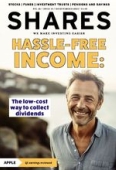Archived article
Please note that tax, investment, pension and ISA rules can change and the information and any views contained in this article may now be inaccurate.
Beating the savings tax trap: what are your options?

For the first time in over a decade, tax on cash interest rates has become a serious problem for savers. The ultra-low interest rates seen in the wake of the financial crisis deprived cash savers of returns, but it meant they didn’t really have to worry about tax, especially after the Personal Savings Allowance was introduced in 2016.
This allows basic rate taxpayers to receive £1,000 of interest each year tax-free, and higher rate taxpayers get a £500 allowance (top rate taxpayers get nothing). However now interest rates have risen, tax on cash returns is back with a vengeance. Compared to the yield-starved years of the 2010s, it’s a nice problem to have, but there are a number of ways to minimise the tax you pay on cash interest.
HMRC expects over 2.7 million people to be hit by savings tax in 2023-24, up by one million compared with estimates for the 2022-23 tax year, according to a Freedom of Information request obtained by AJ Bell.
CASH ISAS ARE THE OBVIOUS PORT OF CALL
Cash ISAs are an obvious port of call for those seeking to shelter their savings from tax. The downside of this approach has always been that you usually have to accept a slightly lower interest rate than on a standard savings account, but for many the implications of not sheltering your interest from tax probably now far outweigh the haircut you take on the headline return. Interest from Premium Bonds is also tax free, though again the headline interest rate is usually below what you can get from other easy access accounts.
The pooled interest is not shared equally either, so you may end up with more or less than the advertised rate. However, that does open up the possibility of winning big on Premium Bonds, an appeal which no doubt partly fuels their popularity.
Stocks & Shares ISAs are perhaps a surprising way of reducing your interest rate tax bill. That’s because you can invest in money market funds within these tax shelters. These funds invest in cash-like fixed interest securities issued by governments and companies, and though they are a bit riskier than cash, they do now come with generous yields thanks to rising interest rates. The interest paid on these funds is tax-free if held within a Stocks & Shares ISA, but investors do need to factor in fund management and platform charges when comparing with other options.
Teaming up as a couple to limit tax
Sharing out cash assets smartly between spouses or civil partners can also be a good way to reduce your tax bill as a couple. This might not mean simply dividing it down the middle though, as each partner may fall into a different tax bracket, which affects both the level of your Personal Savings Allowance, and the rate of tax you pay on interest above that.
To increase tax efficiency, you might consider sharing out savings to make sure each of you is using your Personal Savings Allowance to the max, and beyond that trying to move more interest-bearing cash into the name of the partner in the lower tax bracket, where there is a difference.
It’s possible this approach may lead the lower earning individual to cross into the same tax bracket as their higher-paying partner, at which point the attraction of sharing out more assets is extinguished. It may even result in more tax being paid because your Personal Savings Allowance is related to your tax band. If you move from being a basic rate taxpayer to a higher rate taxpayer you immediately lose £500 of your allowance. So great care needs to be taken where the recipient partner might be pushed into a higher tax band.
While the sharing of cash assets might be desirable from an income tax point of view, there may be other considerations to take into account, such as the background context of other family finances, the convenience of joint accounts, wills and potential IHT liabilities.
USING GILTS
We have also seen investors using short-dated, low coupon gilts to minimise tax. Most of the quoted yield from these investments comes from an appreciation of the price of the gilt between now and maturity, rather than from interest payments.
Gilts aren’t subject to capital gains tax, so some investors have been turning to these instruments instead of cash to minimise the tax they pay. There are costs and charges associated with buying gilts, and they can be difficult to understand, so this route is probably best left to experienced investors, or those who are willing to roll up their sleeves and do their homework on how gilts work.
USING FIXED TERM ACCOUNTS
Savers can use fixed term savings accounts to mitigate their tax affairs. This is because some fixed term accounts only pay out at the end of the term, and so you can defer the receipt of your interest, and hence the tax. This might be particularly useful if you know you are going to drop down a tax band next year, perhaps because you’re retiring, and therefore the interest you receive later rather than sooner will be taxed less heavily. Some fixed term accounts pay out interest more regularly though, so as ever, it pays to be on your toes.
DISCLAIMER: AJ Bell owns Shares magazine.
The editor (Tom Sieber) and author (Laith Khalaf) of this article own shares in AJ Bell.
Important information:
These articles are provided by Shares magazine which is published by AJ Bell Media, a part of AJ Bell. Shares is not written by AJ Bell.
Shares is provided for your general information and use and is not a personal recommendation to invest. It is not intended to be relied upon by you in making or not making any investment decisions. The investments referred to in these articles will not be suitable for all investors. If in doubt please seek appropriate independent financial advice.
Investors acting on the information in these articles do so at their own risk and AJ Bell Media and its staff do not accept liability for losses suffered by investors as a result of their investment decisions.
Issue contents
Feature
Great Ideas
Investment Trusts
News
- Apple wins over jumpy investors despite China growth worries
- Fortinet slumps nearly 20% on weak revenue and outlook
- Hipgnosis looks to steady ship with appointment of ex-Roundhill chair after suspending dividends
- Ferrari speeds to fresh highs following another record quarter
- Does a strong start to November for shares signal the start of a Santa rally?
- Ball deal and buybacks in focus for BAE Systems amid Middle East conflict

 magazine
magazine








